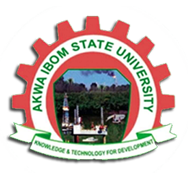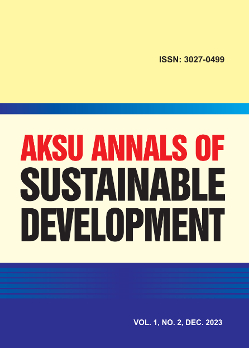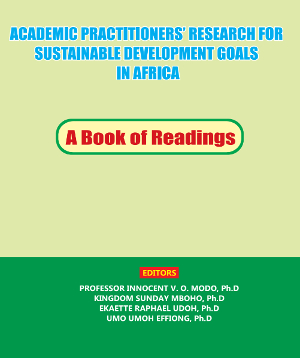Sex Trading And Academic Performance Among Female Students In Akwa Ibom State University
DOI:
https://doi.org/10.60787/aasd.vol2no2.51Keywords:
Sex trading, Transactional sex, Academic Performance, Female students, Akwa Ibom State UniversityAbstract
Sex trading, prostitution and transactional sex among female undergraduate students flourishes in most tertiary institutions, posing serious challenges on health and academic performances among female students in Nigerian Universities. This study examined the relationship between sex trading and academic performance among female students in Akwa Ibom State University. Merton's Strain Theory which sees female students as engaging in sex trading (an illegitimate means) to achieve better academic outcomes was adopted as a theoretical framework for the study. Taro Yamane sampling technique was used to obtain the sample size of 348 for data analysis across the four (4) Faculties in Obio Akpa Campus. The study adopted Survey research design with primary and secondary methods of data collection using a well structured questionnaire as its instrument. Hypotheses were tested using chi square statistical technique. The study revealed a significant relationship between sex trading and poor academic performance among female students in Akwa Ibom State University. As evidence of the findings of the study increased, awareness programmes is needed to pull female student out of this social ills in Akwa Ibom State University.
Downloads
References
Adelekan, A.L, Adeosun, O.A, Adekunle, F.G.,Olunuga, O.D., Oyelami, F.L., and Ekerete-Udofia (2017). Sexual practices of female sex workers in Ibadan, Nigeria. International STD Research and Reviews, 1-10.
Adeyemo, D. O. (2001).Factors Influencing Students' Academic Performance in Nigerian Secondary Schools. Journal of Education and Human Development, 1(1), 34-47.
Agnew, R. (1992). Foundation for a general strain theory of crime and delinquency.Criminology, 30(1), 47-88.
Akinleke, W. O. (2017). Impact of family structure on the academic performance of secondary school students in Yewa local government area of Ogun State, Nigeria.International Journal of Sociology and Anthropology Research, 3(1), 1-10.
Ali, N., Jusof, K., Ali, S., Mokhtar, N., & Salamat, A. S. A. (2009).The factors influencing students’ performance at UniversitiTeknologi Mara Kedah, Malaysia. Management Science and Engineering, 3(4), 81-90.
Alobo, E. &Ndifon, R. (2014).Addressing prostitution concerns in Nigeria: Issue, problems and prospects.European Scientific Journal 10(14), 1857-7881.
Bamford, L. (2017). Sexual exploitation of female students: The role of power dynamics. Journal of Gender Studies, 26(3), 272-284.
Barton, B. (2006). Stripped: Inside the Lives of Exotic Dancers. New York University Press.
Blevins, K. (2018). Sex work and substance use: A review of the literature. Journal of SexResearch, 55(4-5), 544-553.
Bourdieu, P. (1990). The logic of practice.Stanford University Press.
Buchanan, T. (2019).The influence of economic vulnerability on transactional sex among female college students in Sub-Saharan Africa.Journal of Economic Inequality 17 (2) 275 -293.
Cochran, W. G. (1977). Sampling Techniques.John Wiley & Sons.
Comella, L. (2017). Revenge Porn and the Rise of the Digital Sex Worker.In The Routledge Handbook of Sex and the Internet (pp. 255-268).
Creswell, J. W. (2014). Research Design: Qualitative, Quantitative, and Mixed Methods Approaches. Sage Publications.
Dalla, R. L. (2006). Examining the dynamics of street-level sex trading: A feminist perspective.Journal of Contemporary Ethnography, 35(3), 273-295.
Deering, K. N., Strathdee, S. A., Nguyen, C. L., Shoveller, J., Montaner, J., & Kerr, T. (2014). Global epidemiology of HIV among female sex workers: Influence of structural determinants. Lancet, 383(9939), 55-71.
Durkheim, É. (1897). Le suicide. Paris: Presses Universitaires de France.
Effiong, U. U., (2024). Social Security in Nigeria. In Destiny Eze Agwanwo (Eds.). Social Work and Social Legislations in Nigeria. Pp: 35-52. Prime Publishers and Educational Services: Ibadan.
Farooq, M. S., Chaudhry, A. H., Shafiq, M., &Berhanu, G. (2011). Factors affecting students’ quality of academic performance: a case of secondary school level. Journal of Quality and Technology Management, 7(2), 1-14.
Goffman, E., (1963). Stigma: Notes on management of spoiled identity.
Gungul, T. T. &Audu, J. S. (2014). Prostitution as a social evil in Nigeria: Issues and challenges.International Journal of Peace and Conflict Studies,2(1): 2346-7258.
Hill, A. (2015). Sex work and the university: A critical analysis. Journal of Sex Research, 52(3), 257-266.
Hoang, K. (2015). Dealing in Desire: Asian Ascendancy, Western Decline, and the Hidden Currencies of Global Sex Work.University of California Press.
Jackson, S. (2019). Sugar dating and the affective labor of intimacy.Journal ofContemporary Ethnography, 48(4), 451-471.
Jones, A. (2015). "Online Sex Work: Exploring the Intersection of Technology and Sexuality." Journal of Sex Research, 52(3), 257-266.
Kennedy, A. (2004). Sex Trading and Economic Necessity: A Study of Female Students. Women's Social Justice, 10(1), 53-66.Journal
Kerbo, H. R. (2009). Social stratification and inequality: Class conflict in historical, comparative, and global perspective. McGraw-Hill.
Krejcie, R. V., & Morgan, D. W. (1970). Determining sample size for research activities.Educational and Psychological Measurement, 30(3), 607-610.
Kofi, A. T. (2022). Sex Trading and Academic Performance: Exploring the Experiences of Female Students. Journal of Adolescent Health, 70(3), 539-546.
Kumar, R. (2019). Research Methodology: A Step-by-Step Guide for Beginners. Sage Publications.
Lewis, J. (2006). Rethinking Exotic Dance.In The Sexualization of Western Culture (pp. 157-172).
Memmi, A .(1965). The colonizers and the colonized.
Merton, R. K. (1938). Social structure and anomie.American Sociological Review, 3(5), 672-682.
Messner, S. F. (2012). Crime and social control in contemporary society.Routledge.
Misi, O. K. (2008), Nigeria: When University Become Brothers, Retrieved July 26, 2008 from htpp://www.Africanloft.com/Universityorbrothel .
Mutongwizo, T., & Takeaway, N. K. (2018).Transactional sex and dynamics of poverty, power, and violence in African universities. Journal of Youth Studies, 21(3), 257-273.
Narad, A., & Abdullah, B. (2016). Academic performance of senior secondary school students: Influence of parental encouragement and school environment. RupkathaJournal on Interdisciplinary Studies in Humanities Special Issue, 3(2), 12-19.
Nguyen, T., & Kim, H. (2023). The impact of unstable living conditions on vulnerable populations: A comprehensive study of urban housing insecurity. Journal of Social Research, 45(2), 112-129.
Nkala, N. (2014). Rethinking whoredom: Asymmetrical exchange and power dynamics. Journal of Social and Political Philosophy, 15(1), 34-50.
Nyanzi, S., Pool, R., & Kinsman, J. (2001).The negotiation of sexual relationships among school pupils in southwest Uganda.AIDS Care, 13(4), 527-538.
Okeke, C. O., Chukwuorji, J. C., &Nwosu, C. E. (2020). Transactional sex among young women in Nigeria: A systematic review. Journal of Adolescent Health, 66(2), 149-158.
Oladele, O. A., Adeyemi, O. A., &Oladele, A. O. (2019). Sexual risk behavior among female university students in Nigeria: A cross-sectional study. Journal of SexuallyTransmitted Diseases, 2019, 1-8.
Odebunmi, M.,O., ONAJOLE, A.,T.,ABIODUN, O M, OLADELE O A, AKINYEMI, J O, AND AFOLABI,B. M. (2020). HIV prevalence and risk factors among female sex workers in Nigeria.Journal of Acquired Immune Deficiency Syndromes, 84(2), 149-156.
Olubogega, O. (2008). The allure of wealth: Factors influencing adolescent girls' behavior. Journal of Youth Studies, 11(2), 143-155.
Olugbile, S Abu, and Adelakun, (2008),The Punch: Prostitution takes a New Garp on campuses. Punch on line Web Retrieved July 25, 2008 from htpp://www.punching.com/article.aspx? theatricart.
Organisation for Economic Cooperation and Development (2020).Skills outlook 2020: Learning for life Retrieved from OECD.
Osiki, J. O. (2001). Effects of remedial training programme on the management of learning acquisition defectiveness and poor study habits problems of selected subjects in a community grammar school. Nigerian Journal of Applied Psychology, 6(2), 107-115.
Oyeku, E. ,Ngwoke, D.U., Eskay,M., and Obikwelu,C.(2012) Perceived Impact Of Prostitution Tendencies On Academic Performance Of University Undergraduate In South East,Nigeria. Global Journal for Research Analysis, 3(1),pp.45-47.
Pauw, I. and Brener, I. (2003) You are just whores – you can’t be raped. Barriers to Safer sex practices among women street sex workers in Cape Town. Culture Health and Sexuality 5(6) 465 .
Raphael, J. (2004). Listening to the voices of women in prostitution: A feminist approach.Journal of Women & Social Work, 19(2), 141-155.
Roberts, S., Sanders, T., & Myers, E. (2019).Student sex work, financial strain and the UK’s Higher Education funding system.Journal of Youth Studies, 22(4), 433-448.
Robinson, J.O.,and Usman, K.A.(2019). The dark side of the Ivory Tower: An analysis of commercial sex work in Nigeria universities. Journal of Humanities and Social Sciences.
Rono, K., Onderi, H., &Owino, J. (2014). Perceptions of causes of poor academic performance amongst selected secondary schools in Kericho Sub-County: Implications for school management.
Sanders, T., & Campbell, R. (2007).Designing out vulnerability, building in respect: Violence, safety, and sex work policy.The British Journal of Sociology, 58(1), 1-19.
Sanders.T(2007), Protecting the health and safety of female sex workers; The responsibility of all BJOG: An International Journal of Obstetrics And Gynaecology, 114(7),791-792.
Scull, M. (2017). Sugar and spice: Unwrapping the sugar daddy-sugar baby relationship. Sociological Perspectives, 60(1), 141-158.
Shanon, K., Stephan, M., &Simatha, A. (2015). HIV and Sex Work: A Systematic Review of the Literature. Journal of the International AIDS Society, 18(4), 20261.
Singh, S. P., Malik, S., & Singh, P. (2016). Research paper factors affecting academic performance of students. Indian Journal of Research, 5(4), 176-178.
Smith, J., Johnson, K., Williams, D., Brown, L., & Davis, M. (2020). Socioeconomic disparities in sex trading among students: A systematic review. Journal of Adolescent Health, 66(3), 257-265.
Stoebenau, K., Heise, L., Wamoyi, J., &Bobrova, N. (2016).Revisiting the understanding of “transactional sex” in sub-Saharan Africa: A review and synthesis of the literature.Social Science & Medicine, 168, 186-195.
Timothy, P., & Joel, Johnson (2014).Exploring the complexities of sex trading. Journal of Social Sciences, 40(2), 123-135.
Tyoanande, T., & Samson, O. (2014). Commercial Sex Work and HIV/AIDS in Nigeria: An Examination of the Relationship. Journal of Social Science and Humanities.
Udoh, E. R. (2023). Effect of Gender Inequality and Early Marriage on Girl-child Education in Ikot Ekpene Senatorial District. In Book of Readings: Modo, I. V. O., Mboho, Kingdom Sunday, Udoh, Ekaette Raphael & Effiong, Umo Umoh. Academic Practitioners’ Research for Sustainable Development Goals in Africa. pp: 29-39.
Umoh, E. U., Ekpo, O. J., Effiong, U. U., and Asangausung, O. S. (2023). Entrepreneurship Education and Acquisition of Employability Skills among Business Administration Students of University of Uyo. AKSU Annals of Sustainable Development, 1(2), 87-99.
UNESCO (2019), Global Education Monitoring Report Migration, displacement and educational building bridges,net way: UNESCO.
United Nations.(2019). Women’s Economic Empowerment in the Changing World of Work.
Uzokwe, A. O. (2008), Nigerworld, Prostitution in Nigerian campuses (part I) Retrieved July 21, 2008 from htpp://www.yahoo.com.
Wamoyi, J., Wight, D., &Obasi, A. I. (2011). Transactional sex and HIV risk in sub-Saharan Africa: A systematic review. AIDS and Behavior, 15(4), 761-773.
World Bank (2020), Education and the role if Technology. Retrieved from World Bank.
World Bank. (2018). World Development Report: Learning to Realize Education’s Promise. World Health Organization (2019).Mental health and stigma.
Wosick-Correa, K. (2010). Agency and inequality in sex work: An examination of strip club dancers. Journal of Contemporary Ethnography, 39(3), 271-295.
Zimmerman, C., Hossain, M., & Watts, C. (2008).Documenting the physical and psychic harm of trafficking: A study of survivors of trafficking in the Greater Mekong Sub-region.Social Science & Medicine, 66(3), 552-569.
Published
Issue
Section
License
Copyright (c) 2025 AKSU Annals of Sustainable Development

This work is licensed under a Creative Commons Attribution-NonCommercial-NoDerivatives 4.0 International License.
Manuscript content on this site is licensed under Creative Commons Licenses. Authors wishing to include figures, tables, or text passages that have already been published elsewhere are required to obtain permission from the copyright owner(s) for both the print and online format and to include evidence that such permission has been granted when submitting their papers. Any material received without such evidence will be assumed to originate from the authors.





 ICIDR Publishing House
ICIDR Publishing House